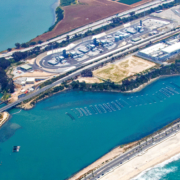Water Utilities Aim to Keep Specially Trained Employees Healthy and Working
Some municipal water utilities are taking emergency measures to sequester some employees to assure that they can keep the water flowing as the coronavirus spreads.
In this country, millions of Americans can follow advice to stay at home so long as the electricity stays on and the water and the phone service. Utility workers need to keep moving about. And to stay on the job, they also need to stay safe. Iowa Public Radio’s Clay Masters reports that some utilities are taking extraordinary measures, including locking in employees at work.
Water utilities take special steps to keep water flowing
MASTERS: I’m standing next to Fleur Drive, which leads into downtown Des Moines. And normally, this is a pretty busy road. It’s not right now because, well, a lot of businesses are shut down. And right next to it is the Des Moines Water Works treatment facility. And what’s different about the grounds right now is that there are 10 campers just parked out front on the lawn.
Water treatment process effective
TED CORRIGAN: At our three treatment plants, we have a total of 21 people who will be living onsite 24/7 in those campers that we’ve placed.
MASTERS: That’s Ted Corrigan. He’s the interim CEO for the Des Moines Water Works that provides drinking water for more than half a million customers. He says they’ve gone deeper into their contagious disease response plan than ever before.
CORRIGAN: But the treatment process is unchanged. It’s unaffected by what’s going on. And it is very effective against viruses, to be sure.
MASTERS: Behind the tall, barbed wire fence, a skeleton crew of operators is doing things like running the control centers and testing the water. Kyle Danley heads water production here. He’s part of the crew that’s putting in at least 12 hours a day before leaving the facility and walking to his isolated camper for the night. He says while some of the workers aren’t used to camper life, the utility can’t take the risk that they get sick. And he says most of the jobs require unique skills and licenses.
KYLE DANLEY: We’re in a specialty field. There’s always a shortage of operators throughout the country, trying to get people interested in this field, but it certainly is something that takes months and years to be able to get those licenses needed. And then just even if you have a license, every plant is specific.
Workers sequester-in-place at Carlsbad Desalination Plant
MASTERS: After two weeks, a new group of workers with the same set of skills, who are currently sitting at home, will switch with the current onsite crew. Something similar is happening at a desalination plant in Carlsbad, California, that produces 50 million gallons of water a day. Ten workers are living there for three weeks. Sandy Kerl is general manager for the San Diego County Water Authority.
SANDY KERL: “These are critical services, highly trained individuals, not easily replaceable, so they have to be protected to ensure that water continues to flow.”





